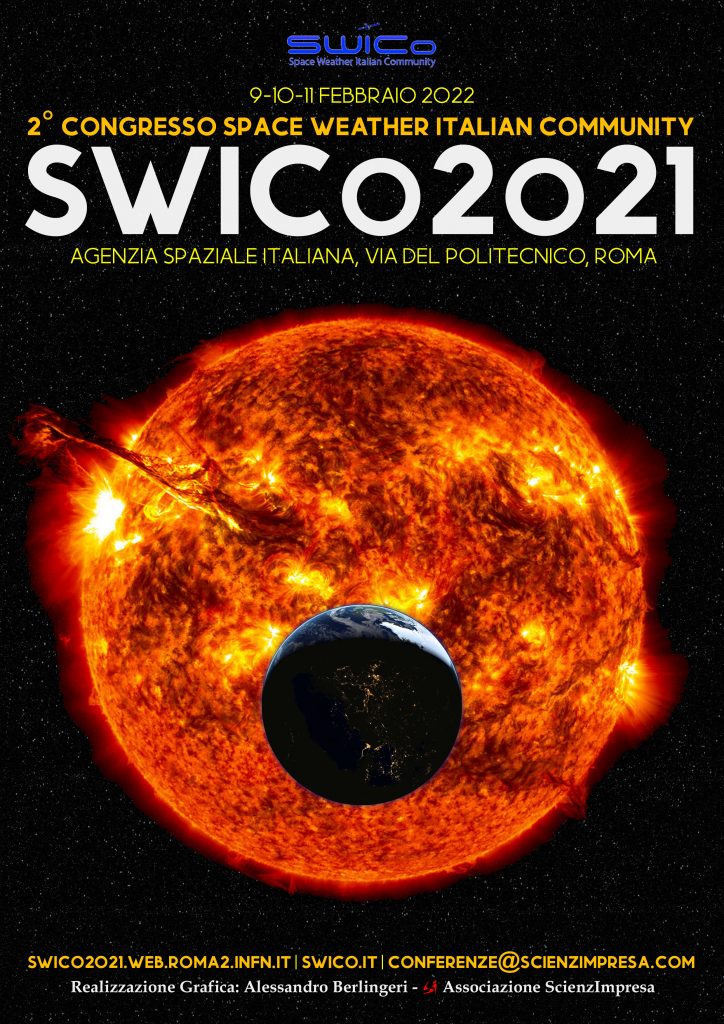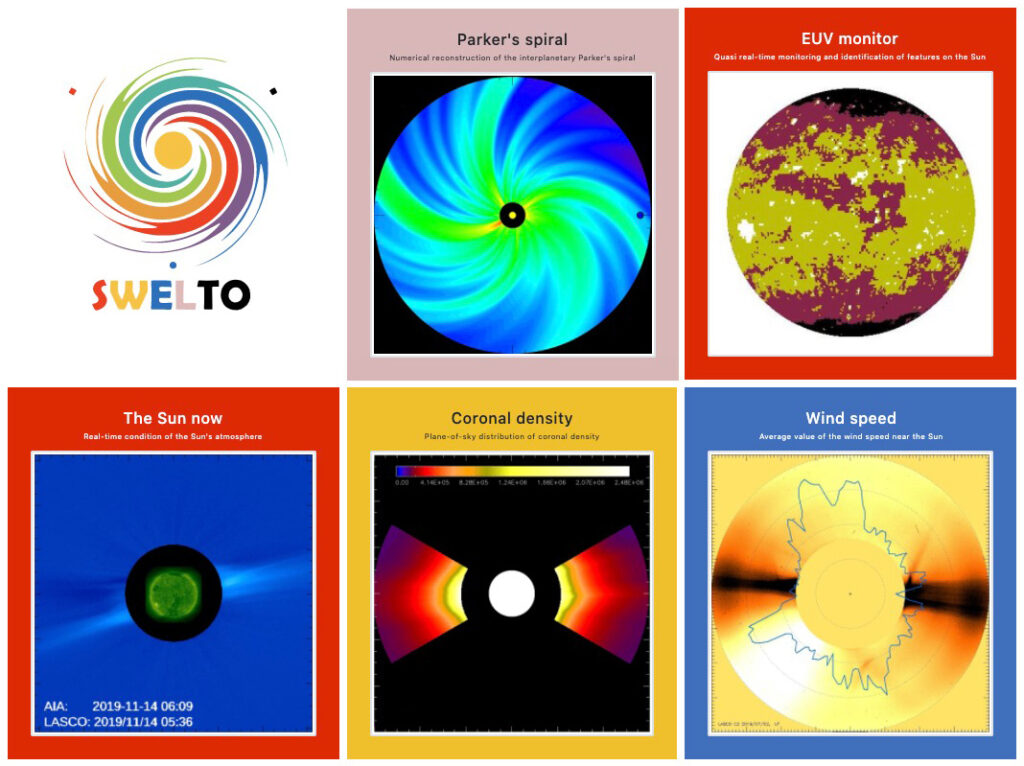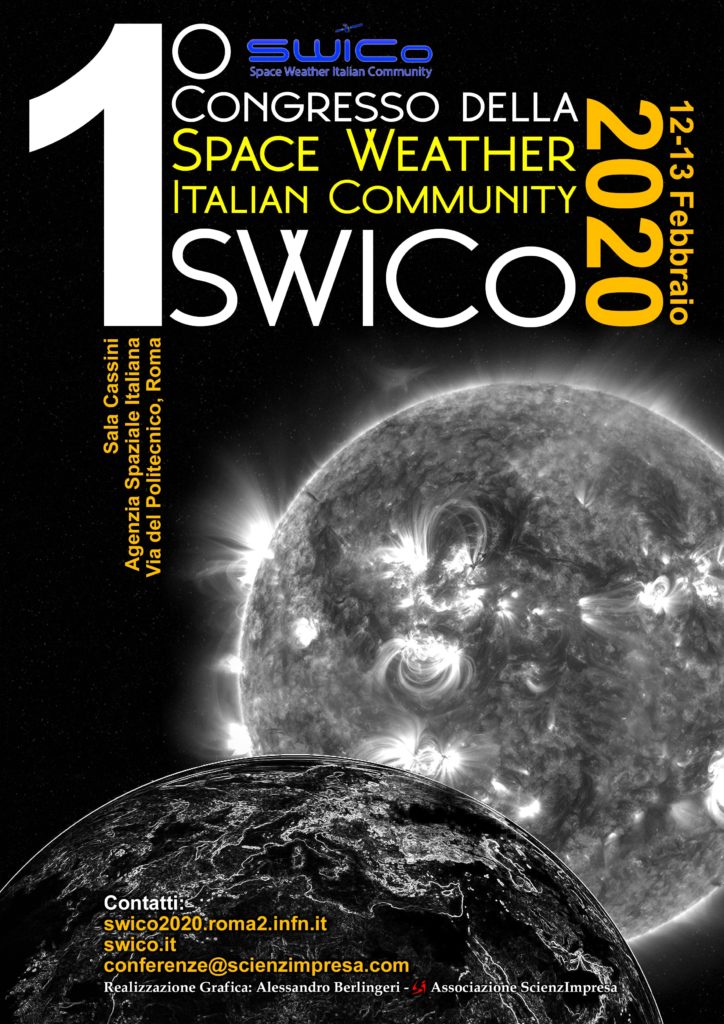Home » SWICo News (Page 2)
Category Archives: SWICo News
Secondo Congresso della Space Weather Italian Community (SWICo)

Il “Secondo Congresso Nazionale SWICo” si terrà a Roma presso la sede dell’ASI nei giorni 9, 10 e 11 febbraio 2022 (https://swico2021.web.roma2.infn.it/). Il Congresso sarà momento di incontro e confronto dell’intera comunità eliogeofisica italiana impegnata nelle discipline relative allo Space Weather (dal Sole all’interno della Terra). E’ pertanto aperto anche a ricercatori e tecnologi non aderenti a SWICo ed è particolarmente incoraggiata la partecipazione attiva di studenti, dottorandi e giovani ricercatori.
Durante il convegno si terrà anche l’Assemblea Nazionale SWICo per il rinnovo degli Organi Statutari.
Il Congresso offrirà anche l’opportunità del conferimento del Premio “Franco Mariani” (https://swico2021.web.roma2.infn.it/premio-mariani), istituito per onorare la memoria di una personalità scientifica di statura internazionale e rivolto a giovani laureati magistrali in discipline inerenti lo “Space Weather”.
La scadenza per l’iscrizione, l’invio degli abstract e delle domande di partecipazione al premio è il 30 maggio 2021.
Premio Franco Mariani

Il Gruppo Nazionale SWICo intende rendere omaggio alla memoria del prof. Franco Mariani, personalità scientifica di rilievo in ambito internazionale, pioniere e protagonista dello sviluppo della ricerca spaziale in Italia, con l’istituzione del Premio “Franco Mariani” per giovani laureati magistrali in discipline inerenti lo “Space Weather” (https://swico2021.web.roma2.infn.it/premio-mariani/).
Il premio è rivolto a giovani laureati magistrali in discipline inerenti lo Space Weather.
Più precisamente, l’ammissione è riservata a laureati delle Università italiane che abbiano conseguito la Laurea Magistrale negli anni accademici 2017-18, 2018-19, 2019-20, e comunque entro la data di scadenza del bando, discutendo tesi su tematiche inerenti lo Space Weather.
La scadenza per l’invio delle domande di partecipazione al premio è il 15 maggio 2021.
VINCENZO FERRARO AWARD 2021 for young scholars in Space Physics

The Vincenzo Ferraro Association intends to pay tribute to Prof. Vincenzo C.A. Ferraro, originally from Sorrento peninsula (Campania, Italy), an astrophysicist and pioneer in plasma physics, in order to encourage studies in the field of space physics.
With this in view, the Vincenzo Ferraro Association, represented by President Maddalena Ferraro, establishes for the year 2021 a “Vincenzo Ferraro” Prize to be assigned, after evaluation by a qualified scientific panel, to a young scholar in the physics of space plasmas with particular reference to his/her doctoral thesis.
Admission to this prize is reserved to students of Italian and foreign universities who have obtained a PhD degree in Physics or equivalent in Italy or abroad after September 1, 2016 with a thesis on topics relevant to the study of space plasmas.
All the details can be found in the attached official announcement.
The SWELTO portal for Space Weather is now operating in real time
The portal of the SWELTO project is now operating and distributing in real-time the first “products” for future Space Weather applications. SWELTO (Space Weather Lab in Turin Observatory) aims to develop and test new diagnostic tools for analyzing space-based data providing real-time information on current conditions on the Sun and in the interplanetary space (https://www.oato.inaf.it/portfolio-items/swelto/).

During the project, new sensors will also be installed at Turin Observatory for the detection of ionospheric disturbances (with a SID monitor) and geomagnetic field disturbances (with a fluxgate magnetometer), now under calibration. Finally, through SWELTO other projects will be involved (such as PRISMA, SAMADHA, or others) that can provide through their sensors other context information related to space weather events.
Now, after more than two years of development, the SWELTO portal (http://swelto.oato.inaf.it/) is able to provide the following products in real time:
- “SunNow”: series of movies showing the evolution of the solar corona (inner corona in the EUV, and intermediate corona in VL) as observed from space along the Sun-Earth line over the last 3 days, up to the latest data currently available from the SOHO and SDO missions;
- “CorDens”: current distribution of the electron density in the intermediate corona as determined from coronographic images of the SOHO/LASCO instrument;
- “WindSpeed”: current distribution of the solar wind expansion velocity measured by the coronographic image sequences acquired by the SOHO/LASCO instrument (still under test);
- “ParkerSpiral”: current distributions of density and outflow speed of interplanetary plasma from 0.1 to 1.1 AU on the ecliptic plane as determined by a MHD numerical simulation constrained to the in situ measurements from ACE;
- “InSitu”: evolution during the last solar rotation (about 27 days) of the conditions of the interplanetary plasma (density, speed, temperature) measured in situ at the Lagrangian point L1 by ACE.
Other modules that will provide other products in real time (such as the occurrence of solar flares or eruptions, or the distribution on the solar disk of regions potentially of interest for space weather) will be activated in the next developments of the project.
SWELTO is a “think tank” where new data analysis methods, numerical models, measurements, and ideas of interest for Space Weather are developed and tested. The project is currently fully supported by the INAF-Turin Observatory.
For more information please contact alessandro.bemporad@inaf.it or download the technical note describing the project in details (https://openaccess.inaf.it/handle/20.500.12386/27715).
Course on “Dynamical Systems and Machine Learning Approaches to Sun-Earth Relations”
The International School of Space Science of the Consorzio Interuniversitario per la Fisica Spaziale organizes a Course on “Dynamical Systems and Machine Learning Approaches to Sun-Earth Relations”, to be held in L’Aquila, Italy, 15-19 June 2020, directed by G. Consolini, D. Del Moro.
The course is devoted to young researchers and PhD students and will provide an introduction and an overview of the recent theoretical, numerical and data analysis advances in the framework of dynamical systems and machine learning approaches to the characterisation and the modelling of Sun-Earth’s relations.
The dynamics of the Sun strongly affects the interplanetary and circumterrestrial environment, causing phenomena that have a great impact on the anthropic activities. In the past, the response of the Earth’s magnetosphere-ionosphere system to the changes of the solar wind and interplanetary conditions due to the solar activity has been widely investigated showing that the dynamics of the coupled solar wind-magnetosphere-ionosphere (SMI) system resembles that of a complex system displaying scale invariant features, turbulence and a near-criticality behaviour. On the other hand, in the framework of dynamical systems, several new tools and methods have been proposed to quantify and characterise the dynamical complexity and its role in nonlinear out-of-equilibrium dynamical systems.
Furthermore, the modelling of the complex dynamics of the SMI system, as such as some features of the solar activity has been shown to benefit from the recent advances in the field of machine learning techniques.
The course will consist in theoretical lectures and laboratory exercitations.
Applications are due before February 29, 2020.
For more information visit http://www.cifs-isss.org/ or send an e-mail to ssc@aquila.infn.it
European Solar Physics Division (ESPD) – 2020 Prizes: First Call for Nominations
Deadline: February 1st, 2020
Since 2017, the European Solar Physics Division (ESPD) of the European Physical Society (EPS) awards three prizes: the ESPD PhD Thesis Prize, the ESPD Early Career Researcher (Postdoc) Prize and the Senior Prize. These prizes are nomination-based. The deadline for nomination is February 1st, 2020.
The 2020 ESPD PhD Thesis Prize will be awarded to a young researcher whose PhD thesis/viva was defended in 2019.
The 2020 ESPD Early Career Prize will be awarded to a young researcher whose PhD was awadered after 01/01/2016 (with possible extension).
The 2020 ESPD Senior Prize will be awarded to a distinguished senior scientist for a life-long prolific career.
Further information about eligibility, documents to be included in the nomination package, and submission process for each prize can be found on the ESPD prizes webpage:
https://www.eps.org/members/group_content_view.asp?group=85203&id=641304#CallPrize
Primo Congresso della Space Weather Italian Community (SWICo)

Dal 12 al 13 febbraio 2020 si terrà il “Primo Congresso della Space Weather Italian Community (SWICo)” presso la sede dell’ASI a Roma (https://swico2020.roma2.infn.it/). Il Congresso tratterà dello Space Weather sia negli aspetti scientifici che in quelli applicativi e organizzativi. Durante il convegno si terrà anche l’Assemblea Nazionale SWICo. Il convegno è aperto anche a ricercatori e tecnologi non aderenti a SWICo e sono incoraggiati la presenza e il contributo di studenti e dottorandi. La deadline per la sottomissione di abstract e iscrizioni on-line è il 16 dicembre 2019.

Doctoral Researcher in Solar Physics at AIP
The Leibniz Institute for Astrophysics Potsdam (AIP) invites applications for a Doctoral Researcher in Solar Physics (f/m/d). The position is within the project »From Flux Emergence to Decay –A High-resolution Study of Sunspots« supported by the German Research Foundation (DFG).
https://www.aip.de/en/career/jobs/jobs-1/doctoral-researcher-in-solar-physics-f-m-d/
The focus of the doctoral research project is the growth and decay of sunspots using state-of-the-art multi-wavelength and multi-instrument high-resolution data in combination with state-of-the-art data handling techniques. During the doctoral studies,the successful candidate will develop expertise in solar observations, imaging and near-infrared spectropolarimetry, high-resolution imaging, spectral inversion techniques, and analysis of data from solar space missions.
We are seeking a highly motivated student with a Master degree in physics or astronomy & astrophysics with good/very good grades according to the German grading scheme for higher education. A good command of spoken and written English and basic programming skills are desirable. Genuine interest or some experience in solar physics research, astronomical observations will be highly beneficial. The doctoral student will be registered at University of Potsdam, which also grant the doctoral degree.
The appointment is a fixed-term contract for three years. The salary is based on the German public service scale (75% working time, TV-L E13), which includes employer contributions to medical and dental insurance, maternity leave and retirement benefits.
As an equal opportunity employer AIP considers individuals for employment according to their skills, abilities and experiences. Preference will be given to handicapped persons with equal competence. Women are especially encouraged to apply.
Applications for and inquiries about the doctoral position should be send to Dr. Meetu Verma preferably via e-mail to bewerbung_2019-19@aip.de. To apply, please send a single PDF file containing curriculum vitae including publications,transcripts,motivation letter including statements on education, skills and experience. If applicable, please attach separately the copies of Bachelor and/or Master Thesis. Applicants should also arrange for two letters of recommendation to be sent. Review of applications will begin 2019 October 1, and continue until the position is filled
Summer School Programme ‘Solar spectropolarimetry: From virtual to real observations’

SOLARNET is pleased to announce the call for its Summer School Programme ‘Solar spectropolarimetry: From virtual to real observations’ to be held between September 9-14, 2019, at Università della Svizzera italiana, in Lugano, Switzerland
More information on: http://solarnet-project.eu/Solar-spectropolarimetry-From-virtual-and-real-observations
Application deadline: June 30, 2019
Contact: solarnetschool1@leibniz-kis.de
Call accouncement – SOLARNET Summer School for Solar Observers – A week above the clouds

Dear Colleagues,We want to draw your attention towards the *SOLARNET Summer School for Solar Observers – A week above the cloudss* which will be held at the Observatorio del Teide in August 5-9, 2019.Our purpose is to instruct students and young postdocs in the capabilities and operation of the German solar facilities at the observatory, by giving them the opportunity to
– run real observations at GREGOR, the largest solar telescope in Europe
– calibrate data by learning how to use the existing data pipelines, Python and deep learning techniques
– learn how to complement ground-based observations with space-based observations
– experience the observers’ life up the mountain for a weekthrough different lectures and experimental activities (programme in SOLARNET webpage available soon).
Due to restrictions in accommodation, the number of participants is limited to 12.To register, please send an email to nbello@leibniz-kis.de with a brief statement of interest indicating your field of research and why you want to participate in the school.Registration deadline: June 15, 2019.
